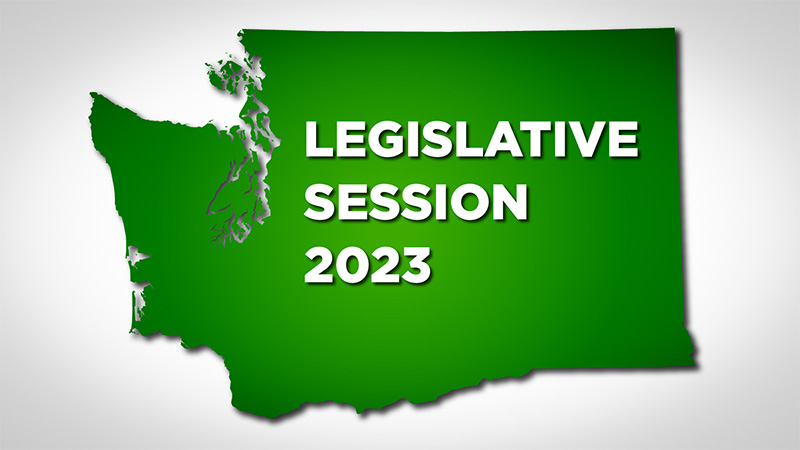
Only 46 days remain of the 105-day 2023 legislative session, barring an extended special session. As of today, legislators have filed 2,024 bills. Yesterday, March 8, was the “cutoff” for bills to have to passed off the debate floor from their House of origin. The lawmakers worked late into the night with that deadline in mind.
The next important deadline is March 29, the last day for bills to pass out of policy committees, with the exception of the House fiscal committees and Senate Ways & Means and Transportation committees.
HB 1363 & HB 1586. These two bills address vehicle pursuits by law enforcement. House Bill 1363—allowing law enforcement to pursue suspected criminals—was significantly altered by removing property crimes from the permissible reasons to pursue. This would impact all retail thefts. WR will work diligently to amend the bill and re-insert property crimes as one of the reasons a pursuit can be engaged. House Bill 1586 would authorize a two-year study on pursuits and best practices to make recommendations to the legislature. It also requires implementation of a vehicular pursuit technology grant program by October 31, 2023 for the purpose of providing modern vehicular pursuit management technology to local law enforcement agencies. WR supports this bill in addition to—not as a replacement for—the original HB 1363. Both bills failed to come up for a vote and are not likely to receive further consideration.
SB 5056. WR strongly supports Senate Bill 5056, which would increase penalties and create a special allegation for repeat or habitual property crime offenders. It would also allow court discretion to sentence a person found beyond a reasonable doubt to be a habitual property offender to an additional 24 months for a Class B felony, and an additional 12 months for a Class C felony. The bill failed to be voted on by the senate and is not likely to receive further action.
SB 5160 would increase the punishments for retail crimes that involve multiple accomplices, with increased penalties for cumulative values involving multiple thefts over 180 days from one or more businesses. If the same criminals stole goods in several counties, each county could prosecute based on the cumulated rate. WR strongly supports this bill and thanks Sen. Nikki Torres (R-15-Pasco) for introducing this legislation. This bill failed to come up for a vote and is not likely to come up for consideration.
HB 1131 is referred to as the WRAP Act (Washington Recycling and Packaging and is currently awaiting action by the full House. The bill contains three major components. First is an extended producer responsibility (EPR) program where producers fund a recycling and disposal program for all packaging. Second, a post-consumer recycled content (PRC) requirement for future packaging. And third, establishing a beverage container reimbursement (BCR) program like the state of Oregon’s. The bill did not receive a vote and is unlikely to receive further consideration.
SB 5368, which WR drafted and strongly supports, would allow injured workers to return to light-duty work through approved non-profit organizations if no light-duty work is available with their employer. If passed, the bill will create equitable access to return to work, which would especially benefit frontline workers and small businesses. The bill failed to come up for a vote and is not likely to receive further consideration.
SB 5259 addresses public safety and retail crime in several ways, the first of which is the establishment of a Retail Theft Task Force in the Office of the Attorney General with specific directives. The second establishes a business and occupation tax credit for physical security improvements to retail establishments, such as security cameras, merchandising security equipment, and crash barriers. Third, cannabis retailers would have an additional reduction in B&O tax to help offset investments in enhanced security improvements. Lastly, retailers with 50 or more employees would be prohibited from disciplining or suspending without pay employees who intervene with the purpose of investigating or questioning the ownership of merchandise in their possession at a retail establishment as long as:
- the employee doesn’t profile the person (suspected criminal);
- the employee does not physically detain or restrain the person;
- the person is engaged in a reasonable manner and for not more than a reasonable time to permit an investigation or questioning by law enforcement or by the owner of the establishment or their authorized employees; and
- the employee had reasonable grounds to believe that the person was committing or attempting to commit theft on the premises of the merchandise.
Retail establishments would also be prohibited from disciplining an employee for notifying or summoning law enforcement to report an incident of organized retail theft or cooperating with an official investigation into organized retail theft. WR’s concerns were addressed and we are now supporting the legislation. The bill is scheduled for a hearing this afternoon, March 9.

